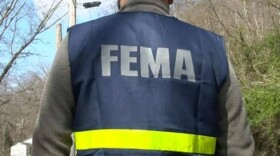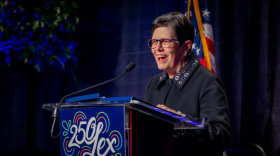Updated July 30, 2025 at 10:43 AM EDT
This story is part of the My Unsung Hero series, from the Hidden Brain team. It features stories of people whose kindness left a lasting impression on someone else.
In 2009, Kim Perlak had just finished graduate school and was juggling roles as an adjunct music professor at different colleges, while also working for a couple of nonprofits.
"At each of these places, as much as I loved them, I just never felt like I really got to know anybody," Perlak recalled. "I never felt like I was part of the community. It was just running in and out all the time."
One morning, Perlak was on her way to one of her teaching jobs. She was walking through campus with a guitar slung across her back and two bags in each hand.
" I'm walking down the path to the music building and I tripped," she said. "And my lunch, which was homemade chili in a plastic container, flew out of my bag and it exploded in the biggest mess."
It wasn't a busy time of day on campus, so Perlak was left to clean up the chili without any witnesses and with little success.
"I had a moment where I was just thinking, 'What am I doing? What am I doing with my life? What am I doing teaching at these places?' And I just felt I was totally alone," Perlak said.
With her next class starting in just a few minutes, Perlak didn't have time to spiral. She was scheduled to work the next eight hours. So, she pulled herself together and headed into her first class.
After a few hours of teaching, it was time for her 15-minute lunch break. She didn't know how she would scrounge something together before her next class. But she was in for a surprise.
While she had thought no one had seen the chili catastrophe that morning, she was wrong.
"The thing that I didn't know was that I wasn't alone, because there's this wonderful woman in the registrar's office and she had seen the entire thing from her window, and she must have looked me up [and] figured out who I was."
The woman took a break from her own workday and drove to a lunch spot beloved by the faculty.
"So, when I came into the little music adjunct office, there was a bag on the table and it had everything in it. It had a sandwich, it had snacks, it had a drink, it had a coffee," Perlak remembered.
There was also a note with the bag. It read, "Dear Dr. Perlak, I saw you come in this morning and I wanted to make sure you had lunch. I hope you have a great day."
That one gesture of kindness changed Perlak's life.
"It changed everything about how I felt in that community. It felt like I belonged there. It felt like people did want to know me."
It also changed how Perlak moved through the world. She started to be conscious of the ways she could show up for other people, much as that woman in the registrar's office had shown up for her.
" I had a wonderful grandmother who used to say, 'Any day can be improved by a sandwich and a cup of coffee.' I think this woman proved that to me and now I get to prove that to everybody else because of her."
My Unsung Hero is also a podcast — new episodes are released every Tuesday. To share the story of your unsung hero with the Hidden Brain team, record a voice memo on your phone and send it to myunsunghero@hiddenbrain.org.
Copyright 2025 NPR








